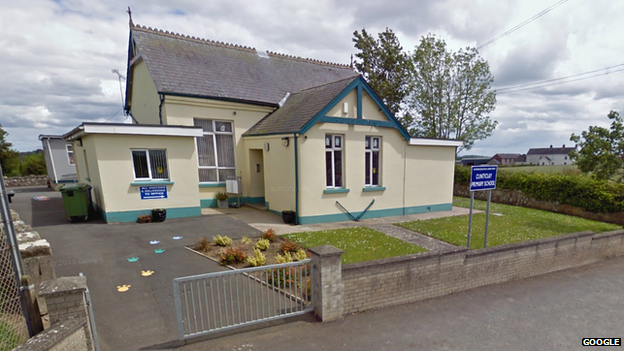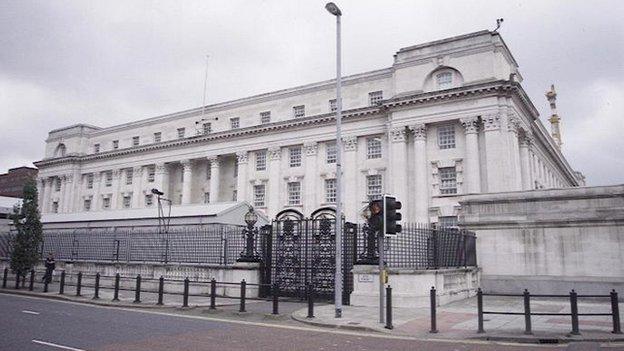Clintyclay primary school: Minister's closure quashed by High Court
- Published

The judge said the education minister faced the possibility of saving an "educationally successful and obviously much-loved school" but had relied on incorrect information
The High Court has quashed a decision to shut the first Catholic school in Northern Ireland that was trying to change to integrated status.
It ruled that the education minister's approval to close Clintyclay Primary was "infected" by incorrect information that the school had financial problems.
It means minister John O'Dowd must take a fresh decision on the future of the school in Dungannon, County Tyrone.
The legal action against the closure was brought by the parents of a pupil.
The couple claimed the court verdict would inject new confidence into the entire community.
'Mistaken'
Clintyclay had been the first Catholic school in Northern Ireland to attempt a switch to integrated status, where children of different faiths would be educated together.
Delivering his ruling at the High Court in Belfast, the judge focused on how the mistaken belief that the school was facing cash problems had featured in the move towards closure.

The judge at the High Court in Belfast said that not only was it incorrect to claim the school was in financial difficulties, but in fact it had a budget surplus
He said the mistake may have originated from a Council for Catholic Maintained Schools (CCMS) parish review which was fiercely disputed by the school and parents.
"In fact, not only was it not in financial difficulties, it had a budget surplus," the judge said.
However the error occurred, it made its way into the decision-making process, the judge concluded.
'Rejected'
The CCMS had proposed that that school should close after its enrolment dropped below 30 pupils.
An alternative proposal advanced by the school's Board of Governors to change its management to grant-maintained integrated status was rejected.
At the time of his announcement last October, the education minister said enrolment numbers meant it was no longer sustainable.
Due to this long-term situation transformation to integrated status was not regarded as a feasible option.
But seeking to judicially review the minister's announcement, a barrister for the parents said the decision should have been deferred until a full assessment of the transformation option was carried out.
'Much-loved school'
The judge said Clintyclay's attempt to transform its status could have "a galvanising impact" on the integrated sector.
"The minister was faced with the possibility of saving an educationally successful and obviously much-loved school at the epicentre of its (local community)," he told the court.
Such an outcome would also have been a "groundbreaking" boost for integrated education.
"The minister clearly and mistakenly made both important decisions on the basis the school was under financial stress," he said.
"It's also clear that the advice given to the minister was infected by the erroneous CCMS report and by this material financial inaccuracy."
Quashing the closure decision, the judge added: "The problem for the respondent in this case is there never was any financial or budgetary difficulties."
'Delighted'
Outside court Gerard Cunningham, who brought the legal challenge with his wife Breda, described the verdict as a fantastic boost in their efforts to keep Clintyclay open.
Mr Cunningham, whose daughter attends the school, said: "We're delighted. This is going to put new confidence back into the school and the whole community."
Their lawyer, Setanta Marley of KRW Law, said: "We are pleased that the minister for education's decision was quashed on the basis that he relied on erroneous information.
"He missed an opportunity to transform the first ever Catholic school in Northern Ireland (to integrated status)."